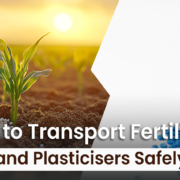Transporting Fertilizers and Plasticisers Safely in Flexitanks
The efficient global movement of essential industrial chemicals, specifically liquid fertilisers and plasticisers, is critical to the agriculture and manufacturing sectors. These substances, while generally classified as non-hazardous bulk liquids, demand meticulous handling to ensure safety, prevent contamination, and maintain product integrity. Fortunately, the use of flexitanks has emerged as a superior solution for liquid cargo transport, surpassing the limitations of traditional drums and IBCs.
A flexitank is a high-capacity, single-use polymer bag installed inside a standard 20-foot shipping container, transforming it into a safe, efficient vessel for Bulk Liquid Transport. For shippers involved in transporting fertiliser and plasticisers, the adoption of flexitanks offers significant cost savings and streamlined logistics, provided strict adherence to safety and chemical compatibility protocols is maintained.
Foundational Safety Practices for Bulk Liquid Transport
Regardless of the non-hazardous nature of the liquid, general safety guidelines must be strictly observed to prevent spills, leaks, and operational failure. These practices are the authoritative core of reliable liquid cargo transport.
1. Certification and Compatibility
The first step is selection. Always choose a flexitank from a reputable manufacturer certified to international standards. Crucially, the tank material must be chemically compatible with the specific product being shipped to prevent corrosion or degradation of the flexitank.
2. Container Vetting and Preparation
The integrity of the container is paramount. Before installation, a standard 20-foot dry-box container must be thoroughly inspected for sharp edges, debris, or rust that could puncture the polymer bladder. Use only a clean, dry container to eliminate contamination risk. Proper installation includes securely fitting the flexitank and installing a reinforced bulkhead or restraining system near the doors to prevent bulging during transit.
3. Operational Expertise and Control
Only personnel trained in flexitank installation, loading, and unloading procedures should be involved. Filling the tank must be executed at a controlled, steady rate to prevent material stress and overloading. Once filled, the valve must be securely locked and sealed.
4. Temperature Monitoring and Declaration
Temperature variations can affect both the viscosity of the liquid and the material properties of the flexitank. For liquids that may thicken (such as some liquid plasticisers), systems with built-in heating capabilities can ensure smooth and efficient unloading. All contents must be accurately declared in shipping documents and clearly labelled on the container for proper liquid cargo transport handling and regulatory adherence.
Product-Specific Requirements: Transporting Fertilizer and Plasticizers
Transporting Fertiliser
Liquid fertilisers, vital for global crop production, are often shipped in concentrated forms.
- Chemical Compatibility: The flexitank material must resist the chemical composition of the fertilizer. A reputable supplier will confirm the polymer layers are non-reactive and corrosion-resistant, protecting both the tank and the valuable agricultural product within.
- Environmental Protection: Flexitanks provide a sealed, controlled environment. This is essential because many liquid fertilizers are sensitive to external elements, which can compromise their efficacy before application.
- Sustainability Advantage: Moving concentrated liquid fertilizers via Bulk Liquid Transport in flexitanks drastically reduces the total number of shipments required compared to shipping in drums. This not only cuts down logistics costs but also significantly lowers the overall carbon footprint of the supply chain, aligning with modern sustainability goals.
Transporting Plasticizers
Plasticizers are chemical additives used to increase the flexibility and durability of plastics and polymers.
- Corrosivity Resistance: Some plasticizers can be aggressive. For these, the flexitank fabric must offer advanced corrosivity resistance. Leading manufacturers often use multi-layered designs with specialized barrier technology to prevent chemical attack on the tank material.
- Specialized Barriers (EVOH): To preserve the quality and chemical integrity of sensitive plasticizers, barrier flexitanks are recommended. These often incorporate a special inner layer, such as Ethylene Vinyl Alcohol (EVOH), which acts as a powerful barrier against oxygen and moisture ingress, preventing contamination and degradation of the product quality.
- Quality Preservation: The hermetically sealed nature of the flexitank ensures the plasticizer arrives in the same high-quality condition it was loaded in. This is critical for manufacturers who rely on precise chemical specifications for their end products.
The Value of an Expert Partner in Bulk Liquid Transport
Choosing an experienced flexitank supplier transforms your liquid cargo transport from a logistical hurdle into a competitive advantage. An expert partner understands the nuances of transporting fertilizer and plasticizers, offering not just a product, but a complete, certified system that minimizes risk and maximizes efficiency. Their knowledge of chemical compatibility, international regulations, and product-specific handling is invaluable.
By investing in high-quality, certified flexitanks and strictly following established safety protocols, businesses can confidently leverage the volume and cost benefits of Bulk Liquid Transport for these crucial industrial materials. Safety and compliance are the ultimate measures of effective logistics.
The Secure Choice for Industrial Liquids
Transporting fertilizer and plasticizers in flexitanks is proven to be an efficient, cost-effective, and environmentally conscious method for Bulk Liquid Transport. Success is predicated on careful material selection (ensuring chemical compatibility) and strict adherence to COA-certified installation and loading procedures. By choosing specialized flexitanks with appropriate barriers and safety features, you safeguard your product’s quality and ensure global compliance.
It is time to choose a certified partner dedicated to the secure and efficient transport of your vital industrial liquids.
Ready to enhance your liquid cargo transport safety and efficiency? Contact Fluid Flexitank today to secure expert-backed solutions for transporting fertilizer and plasticizers.

